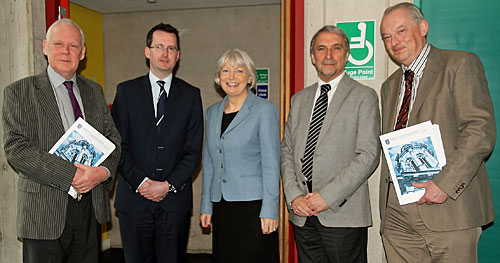Examining Theory and Practice in Inclusive Education
Posted on: 03 May 2012
The School of Education recently hosted a one-day conference titled ‘Examining Theory and Practice in Inclusive Education’. The event was organised by the School’s Inclusion in Education and Society research group.
The School of Education’s Inclusion in Education and Society research group was established to examine inclusive theory, policy and practice in education. Inclusive education policy and practice has made significant progress internationally and nationally over the past decade. Irish legislation enshrining an inclusive education policy (EPSEN, 2004) has been enacted and support structures within schools have been developed to enable children with difficulties in learning to access the curriculum. The understanding of inclusion has shifted somewhat away from an exclusive focus on special educational needs towards an understanding that inclusion concerns every child and adult within schools and wider society. It is gradually being recognised that many children can be disadvantaged for whatever reason and inclusive schools aim to address the learning, social and emotional needs of all children.

L-R Head of the School of Education, Prof Mike Grenfell, TCD Senior Lecturer, Dr Patrick Geoghegan Conference Chair, Dr. Helen O’Sullivan of the TCD School of Education, Prof Mel Ainscow of the University of Manchester, and Dr Michael Shevlin of the TCD School of Education and conference organiser
Some of the latest research in the area of inclusion was presented at this conference and participants had an opportunity to reflect on the challenges that face educators, particularly in a time of economic recession. The keynote speaker, Professor Mel Ainscow of the University of Manchester examined the concept of inclusive practice and argued for the creation of professional communities of practice within schools in order to develop inclusive learning environments. Trinity’s Head of the School of Education, Professor Mike Grenfell examined the theoretical underpinnings of psychology and inclusion and suggested ways to develop a theory of practice within this area. Latest research was presented, ranging from arts based interventions to support children and young people with autism, the use of psychology in education in inclusive settings, inclusion and voice of people who are marginalised within society, parental perspectives on early intervention, educational transitions and progression pathways for people with special educational needs, and the implications of categorisation approaches for educational provision.
It was concluded that significant challenges remain. However, the conference was an opportunity to reflect on what is working, what needs to be done, and on how we can advance our understanding of inclusion theory and practice within schools and society.
The conference also saw the launch of the new Psychology of Education research group. Strong interest in the event saw the participation of delegates from the fields of educational policy, practice and research. The keynote lecture from Professor Mel Ainscow of the University of Manchester was particularly well received and was facilitated by the TCD Visiting Professorships and Fellowships Benefaction Fund.
